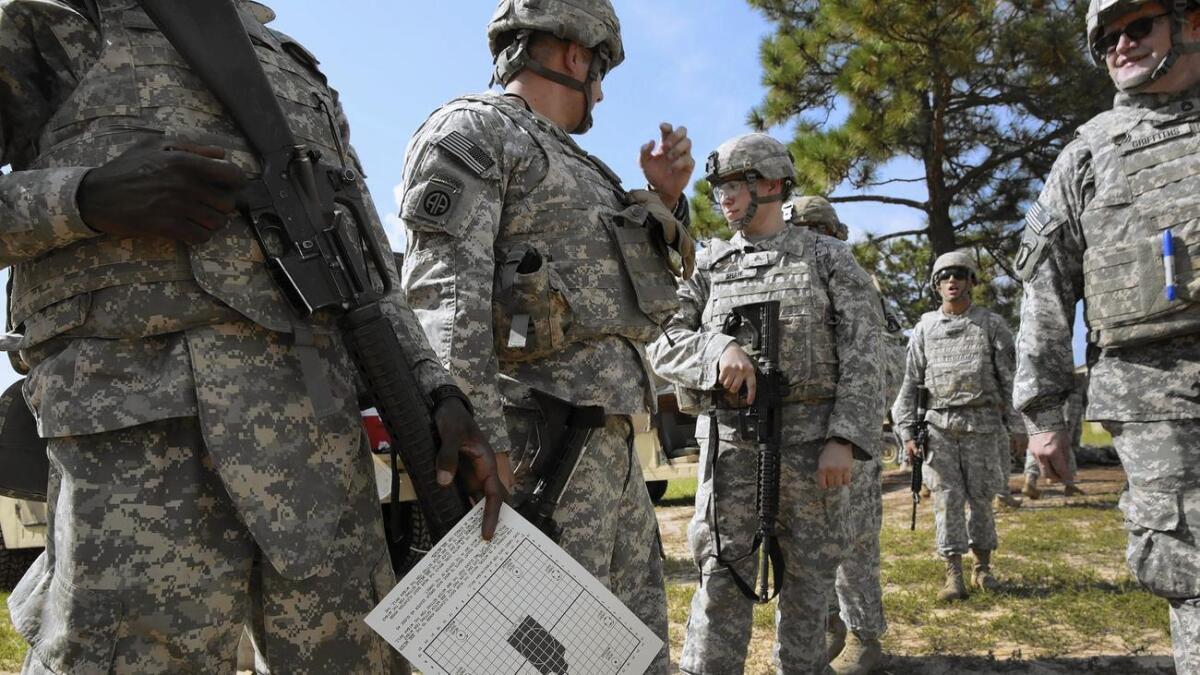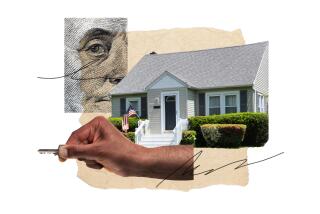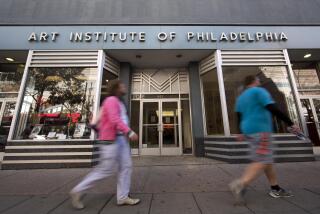Generous GI Bill isn’t keeping today’s veterans out of student loan debt

The latest GI Bill is available to veterans who served after the 2001 terrorist attacks, like these soldiers training at Ft. Bragg, N.C.
- Share via
Despite the generous benefits of the latest GI Bill, military veterans attending college are taking out substantial student loans, raising concerns among veterans’ organizations that they are unnecessarily diving into debt.
For most veterans, the GI Bill covers four academic years of tuition at public colleges and universities, and has programs to cover the vast majority of expenses at many private institutions. Veterans also receive a monthly living allowance — averaging about $1,300, depending on where they live — to help cover expenses while they attend school.
But data compiled for The Times by the Department of Education show that in one academic year — 2012, the latest available — 26% of undergraduates receiving veterans education benefits also took out federal or private education loans. The average loan was $7,400 — slightly more than for students who had never served in the military.
The figure suggests that beneficiaries could easily accrue more than $25,000 in debt to graduate with a four-year degree.
Veterans groups and lawmakers are concerned about borrowing by GI Bill users, who ideally should be able to graduate debt-free. “It’s a big issue,” said Walter Ochinko, policy director for the nonprofit organization Veterans Education Success. “We hear from a lot of veterans who have debt.”
The latest GI Bill is the most generous veteran education benefit since World War II. It took effect in 2009 and is available to veterans who served after the Sept. 11, 2001, terrorist attacks.
More than 1.4 million veterans and their family members — veterans can transfer their benefits to their children and spouses — have used the bill, at a total cost of more than $42 billion.
Experts say one reason veterans take out student loans is because they can.
Federal law prohibits colleges and the government from considering GI Bill benefits when determining financial aid. That allows veterans to take out low-interest education loans to use as they see fit.
Will Hubbard, a spokesman for Student Veterans of America, said veterans often have many more responsibilities than their college classmates, so it may make sense to take out the loans. “They’re not your typical 18- to 20-year-old students who just got out of high school,” he said. “In many cases, they have families with children.”
Some also use the money to pay off other debts or educational expenses not covered under the GI Bill. Veterans with less than three years of active duty receive reduced benefits.
How deeply do veterans go into debt? The problem is difficult to assess because federal financial aid forms don’t ask for veteran status.
At The Times’ request, the Department of Education compiled data from its latest National Postsecondary Student Aid Study, which is conducted every three to four years with a representative sample of students — about 95,000 undergraduates in 2012, including 3,500 or so veterans.
Beneficiaries at for-profit schools — which take a disproportionate share of GI Bill funding and have been under fire for their high costs and low job-placement rates — are more likely than those at other institutions to take out loans, the data show.
Among veterans with benefits at two-year-schools, 31% at for-profits took out loans in the academic year ending in 2012, compared with 13% at public schools. At four-year schools, the rates were 37% at for-profits, 33% at public schools and 28% at private nonprofits.
Tom Babel, the vice president for regulatory affairs at DeVry University, one of the largest for-profit chains, said federal law should be changed to factor in the GI Bill when determining eligibility for loans. “The law does not allow us to deny students with veteran benefits from taking out loans if they want them,” he said in a statement.
But Ochinko said his organization had found several cases in which schools have encouraged veterans to take out federal loans.
One reason, he said, is that it allows the schools to be paid faster. The GI Bill pays tuition directly to the school, but sometimes it does not arrive until after the term has started, he said. Once GI Bill payments arrive, they are refunded to the veterans, Ochinko said.
Twitter: @AlanZarembo
ALSO:
Crowdfunding 2.0: SEC just made it easier to buy shares in start-ups
Investor Ackman defends Valeant in 4-hour conference call
After diving deep through icy geysers, Cassini sends images of Enceladus
More to Read
Sign up for Essential California
The most important California stories and recommendations in your inbox every morning.
You may occasionally receive promotional content from the Los Angeles Times.











